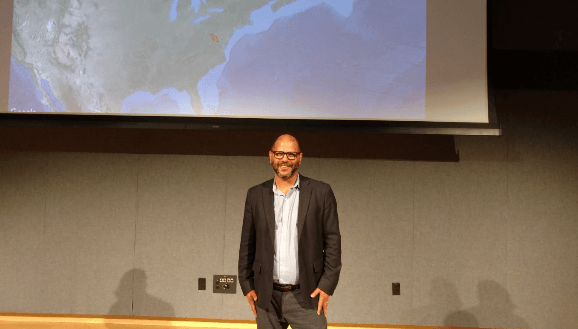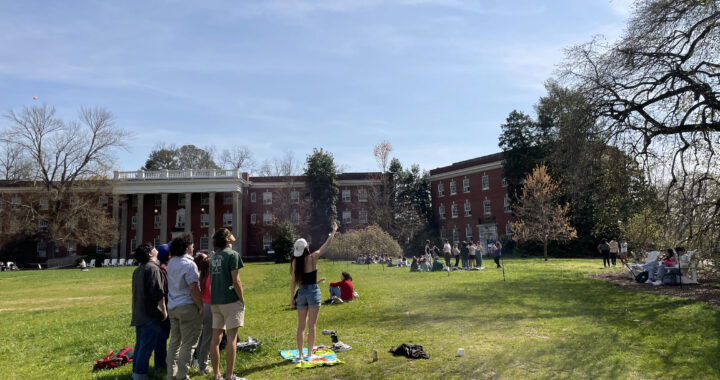Artist Hasan Elahi discusses racism in digital art world
3 min read
Emily Grottle | The Blue & Gray Press
By EMILY GROTTLE
On Tuesday, April 4, artist Hasan Elahi spoke at the University of Mary Washington about his unique artwork and the history behind it. Elahi is associate professor for the Department of Art at the University of Maryland, and recently won a Guggenheim Fellowship, a Hugh M. Hefner First Amendment Prize and grants from the Doris Duke Foundation for Islamic Art. Even without getting a high school degree, Elahi found that he can study any subject through the arts.
Elahi’s art has quite a history that cannot be fully conceptualized just by looking at some of his pieces. In 2001, he was profiled and taken in by an FBI agent in an airport. He was profiled because he was seen leaving his storage unit on September 12, 2001, with what were apparently explosives – clearly this was not the case.
Since that incident, Elahi has had to check in with his FBI agent George throughout all of his travels as an artist. Elahi began to take pictures of everything he did and log them, this included taking pictures of the beds he slept in and the toilets he used, the foods he ate and places he went to. Through this continuous logging and checking in with the FBI, Elahi found the relationship between physical and digital space, questioning what private space and public space is.
In today’s age, nothing seems private no matter how hard we try. Elahi points this out in his artwork. In his piece titled “Citizen” from 2006, Elahi reflects on the idea of “putting it all out there” while trying to be private, juxtaposing the idea of a public and private space.
This piece is representative of a patch of camouflage worn by the United States Military, but created with multiple pictures from different places around the world. According to Elahi, the camouflage worn by the troops are representative of a “silhouette of a body broken,” a body that the enemy cannot see in night vision goggles. That is truly what camouflage is supposed to be, and he creates the image of it with smaller pictures he has captured.
One of the biggest themes in Elahi’s work is the impact of war and landscape. Not just war, but surveillance as well – the concept of constantly being watched. You may not think about it, but anytime you use a location on your phone or search something on Google, you are being tracked.
Surveillance has become such a regular part of today’s society that Elahi exposes it, shows us that “with every Big Brother, there are a Thousand Little Brothers watching.” This comes through in his piece title “Thousand Little Brothers” from 2014, where he looks at concepts of privacy, secrecy and transparency.
In a world of having to comply to this surveillance, Elahi gives what he calls “aggressive compliance,” leading back to when he logged his life for the FBI Agent George, just cutting out the middleman and making everything public.
Elahi is able to take a private space and make it public through his art, showing us that we already allow ourselves to constantly be watched in a beautiful way, which juxtaposes those in power who want to know everything about us.
His artwork is truly a representation of modern day war and landscape, and is a beautiful metaphor of surveillance in America and around the world.












1 thought on “Artist Hasan Elahi discusses racism in digital art world”
Comments are closed.